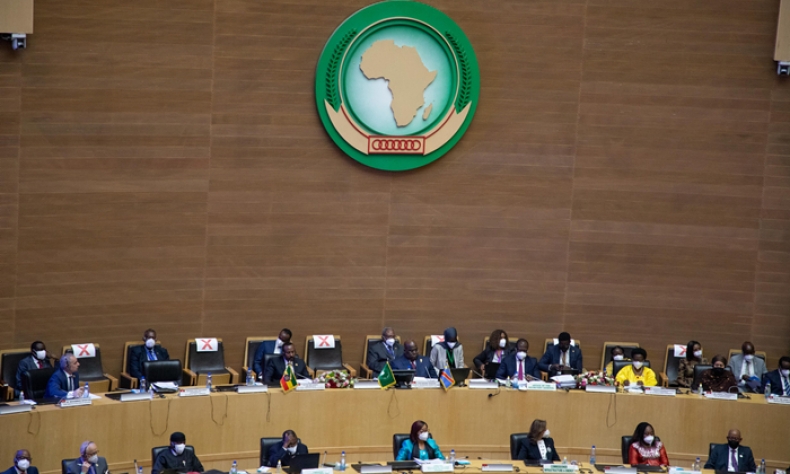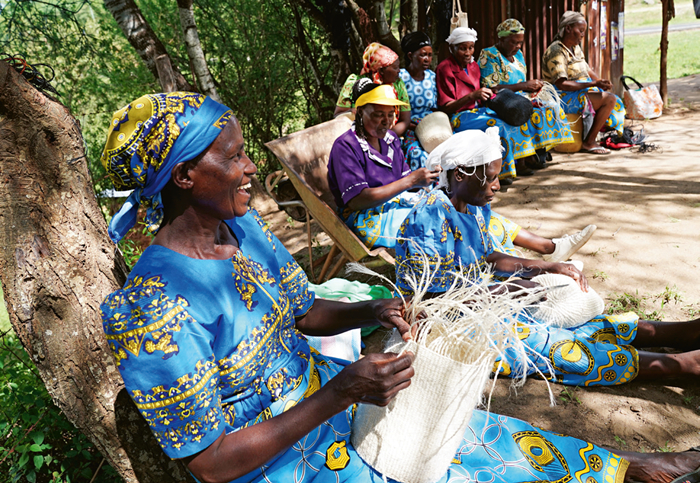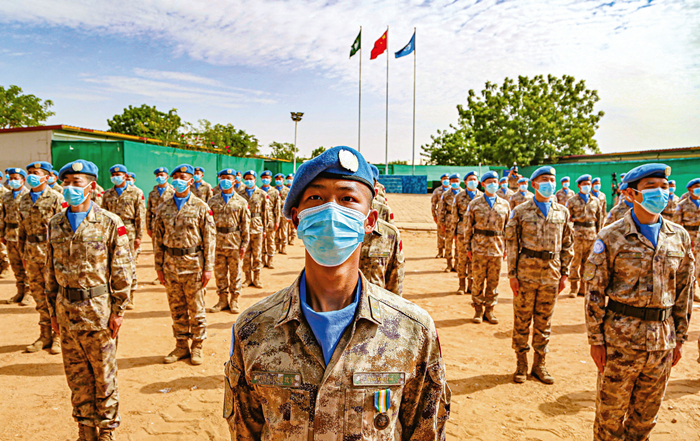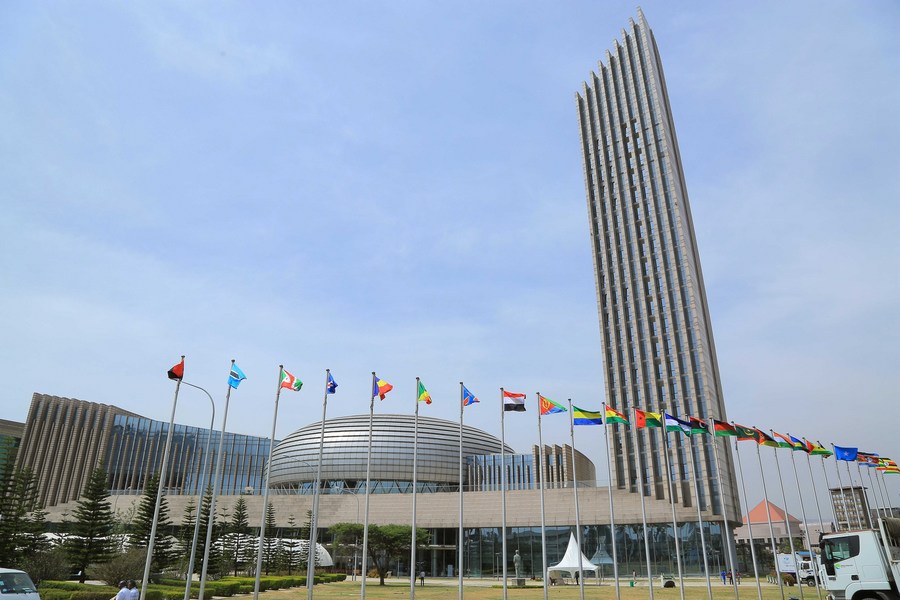In Unity There Is Strength

China is an important partner for the AU in jointly building a high-level China-Africa community with a shared future and safeguarding international fairness and justice.
This year marks the 20th anniversary of the founding of the African Union (AU). The union is striving to realize the Pan-African vision of “an integrated, prosperous and peaceful Africa, driven by its own citizens, representing a dynamic force in the international arena,” as stated in its Agenda 2063 blueprint.
During these 20 years, the AU has made notable achievements in pushing forward African integration and development. The launch of the African Continental Free Trade Area (AfCFTA), establishment of Pan-African digital applications, signing of an intra-Africa air traffic accord and women’s empowerment are some of the major fields of progress.
The role and achievements of the AU are highly regarded by China. In a congratulatory message to the 35th AU Summit on February 2, Chinese President Xi Jinping noted that over the past 20 years, the AU has stayed committed to seeking strength through unity, actively explored a development path suited to Africa, facilitated important progress in regional integration and coordinated a concerted response from African countries to the COVID-19 pandemic.
Such efforts have proven effective in maintaining peace, stability and development in Africa, and have won Africa growing influence and stature in the world, Xi said.
Strengthening Africa
The AU was the outcome of a consensus among African leaders to refocus Africa’s attention toward increased cooperation and integration of African states to drive Africa’s growth and economic development, from fighting for decolonization and end of apartheid, which had been the key goals of its predecessor, the Organization of African Unity (OAU), according to the statement of the organization.
Agenda 2063 is the blueprint of the AU for achieving its vision. Adopted in 2015, the master plan identifies seven aspirations and 15 flagship programs, as well as transformational outcomes to be achieved in its First 10-Year Implementation Plan.
According to the Second Continental Report on the Implementation of Agenda 2063 published in February this year, though progress in various aspects of Agenda 2063 was slow, largely due to the impact of COVID-19, notable advances have been made in several fields, especially regional integration, as compared to 2019.
The progress in regional integration is mainly reflected in the launch of the AfCFTA in January 2021, which is listed as one of the flagship programs of Agenda 2063. As of June, 54 of 55 members of the AU have signed the AfCFTA agreement, and 43 have deposited their instrument of ratification. The operationalization of a well-functioning AfCFTA Secretariat in Accra, Ghana, is a hallmark of progress in regional integration.

Another field that registered considerable progress is women’s empowerment, with an increase in the proportion of women in rural areas who have ownership or secure rights over farmland, as well as the proportion of seats held by women in national and local parliaments.
Women make up about 50 percent of the African population and the AU thinks they are underrepresented in leadership roles across finance, investment and entrepreneur fields. The AU believes that the continent loses over 20 percent of its GDP every year due to gender gap.
It therefore places high emphasis on gender equality and women’s empowerment, which it believes is key to people-driven development of Africa as stated in one of the aspirations of the AU Agenda 2063. Over the years, the organization has achieved major milestones in promoting the cause.
The AU has also included gender parity as part of its institutional reforms. The AU Assembly of the Heads of State and Government in 2018 set the goal of having 50 percent women and 35 percent youth as its members by 2025. Though these overall targets are yet to be met, gender parity has been achieved at the level of commissioners since 2003.
As part of the AU’s latest effort on its gender equality agenda, the What African Women Want campaign was launched on International Women’s Day on March 8 in a bid to raise public awareness of gender equality. It highlights key issues such as child marriage, gender violence and harmful traditional practices, and the need to ensure women’s equal access to economic resources. Special attention is given to less-privileged women, such as women with disabilities, migrant women and women in rural areas. Men and boys are also called upon to make contributions to gender equality.
Apart from these two fields, commendable progress is also registered in peace and security as well as growing “Africa as a strong, united, resilient and influential global player and partner” as described in Aspiration Seven of Agenda 2063.
Tightening China-Africa ties
“China is an important partner for the AU in jointly building a high-level China-Africa community with a shared future and safeguarding international fairness and justice,” Liu Yuxi, Head of Mission of China to the African Union, wrote on the 20th anniversary of the AU.
Liu is the second Chinese ambassador to the mission. The setting up of the Chinese mission in 2015 was part of the increasingly tightening interaction between the AU and China. In September 2018, the AU Commission also announced the appointment of Ambassador Rahmat Allah Mohamed Osman as Permanent Representative of the AU to China.
According to Liu, a profound friendship had already been forged between China and the OAU in the struggle against imperialism and colonialism, and the fight for national independence and liberation. The foundation of the AU took China-Africa relations to a new stage.
In particular, strong solidarity was clearly visible in the fight against the COVID-19 pandemic. In February 2020, the AU issued a communique in support of China’s anti-pandemic efforts during the 36th Ordinary Session of the AU Executive Council, becoming the first international organization to offer China such support.
China also provided solid support to Africa in fighting the pandemic. So far, China has sent more than 100 batches of medical supplies to African countries and the AU. Other examples of significant Chinese support to the AU include the new AU Conference Center and Office Complex built by the Chinese Government free of charge, which was commissioned in January 2012. The China-aided headquarters of the Africa Centers for Disease Control and Prevention (Africa CDC), a specialized technical body and public health arm of the AU, started construction in December 2020 and the buildings of phase 1 were topped out at the end of 2021.

Through cooperation with the AU, China has been able to directly contribute to maintaining peace and stability in Africa by taking part in the AU’s peacekeeping missions, such as the UN-AU Hybrid Operation in Darfur (UNAMID).
The 16th Chinese peacekeeping engineer contingent to Sudan returned to China after successfully completing a 10-month peacekeeping mission on August 4, 2021. As the only engineering and support force of the UNAMID in the region, the contingent completed over 290 construction support tasks, which were rated as a “benchmark” for peacekeeping forces by the UNAMID. All peacekeepers of the contingent were awarded the UN Peace Medals of Honor.
China and the AU set another milestone in their cooperation when they agreed to jointly promote the Belt and Road Initiative (BRI) in December 2020. With a focus on promoting policy coordination, infrastructure connectivity, unimpeded trade, financial integration, and people-to-people bonds, the initiative is seen as an effective driver in helping the continent realize Agenda 2063. Following the provisions of the plan, China and the AU signed a memorandum of understanding (MoU) for establishing a coordination mechanism for the Belt and Road cooperation in December 2021.
The signing of the MoU marked “a new phase of implementation of the China-Africa joint construction of the BRI, injecting new impetus into China-Africa win-win cooperation and common development,” Liu wrote.
Responding to challenges
The ongoing COVID-19 pandemic remains a major challenge to the AU in achieving its Agenda 2063 goals. Over the past years, the pandemic has not only threatened the health and lives of the African people, but also made severe impact on other Agenda 2063 indicators such as employment and people’s living standard.
In the view of Ehizuelen Michael Mitchell Omoruyi, Executive Director of the Center for Nigerian Studies, Institute of African Studies at Zhejiang Normal University, the AU has performed well in the past years since the outbreak emerged.
Indeed, from the outset of the pandemic, the AU was one of the first institutions on the continent to swiftly adopted Africa Joint Continental Strategy for COVID-19 Outbreak following an emergency meeting of African ministers of health.
“The strong mobilization of African leaders and the effective coordination provided by the AU in the joint continental response are testimony to the ability of Africa to face the challenges in a united and resolute manner,” Omoruyi told ChinAfrica.
He believed that the AU has also played a key role in using regional trade blocs to coordinate, consolidate, and connect resources across the continent, as well as in lobbying for equitable access to vaccines and debt relief for particularly vulnerable countries where the economy has slumped because of the pandemic.
He said the major concern is that most countries on the continent face worryingly low vaccination rates as underfunded health systems struggle to deliver the available vaccines to rural areas, while national government messaging has done little to overcome vaccine hesitancy, even among health workers. Although the AU has helped procure nearly 500 million vaccine doses for the continent, he believed manufacturing locally and having more vaccines are just one part of the puzzle.

“The AU must be doing more if the continent wants to increase vaccination rates,” he said, adding that this means strengthening overall health systems – optimizing supply chains so Africans can access syringes and necessary raw materials, improving cold chain equipment, and boosting vaccine education.
Another major challenge to the AU’s leadership is the possible food crisis in the continent, which has become critical as extreme weather, the pandemic, and conflicts, including the Russia-Ukraine conflict, have threatened Africa’s food systems.
Noting the progress that African countries have made in strengthening food systems and accelerating human development in the last 20 years, Omoruyi said the AU as well as national governments and regional organizations have prepared themselves with a multitude of policy priorities aimed at addressing Africa’s food crisis. Food production, especially of staple foods, has been increased by redirecting funds to small-scale food producers across the continent and promoting food sovereignty to protect the population from erratic food markets.
Other policies include reducing post-harvest food losses to make more food available, investing in climate-smart agriculture to produce climate-smart technology for farmers, and promoting intra-African trade in agriculture and services via the AfCFTA.
In addition, the Comprehensive Africa Agriculture Development Program Biennial Review mechanism is in place to take stock of progress and pinpoint areas of focus for AU members in agricultural transformation. The AU is also working to establish an African Food Safety Agency, in which the AU would welcome collaboration with the continent’s partners.
“I am confident that with these policy priorities, the AU can address the food crisis in Africa,” Omoruyi said.
 Facebook
Facebook
 Twitter
Twitter
 Linkedin
Linkedin
 Google +
Google +










